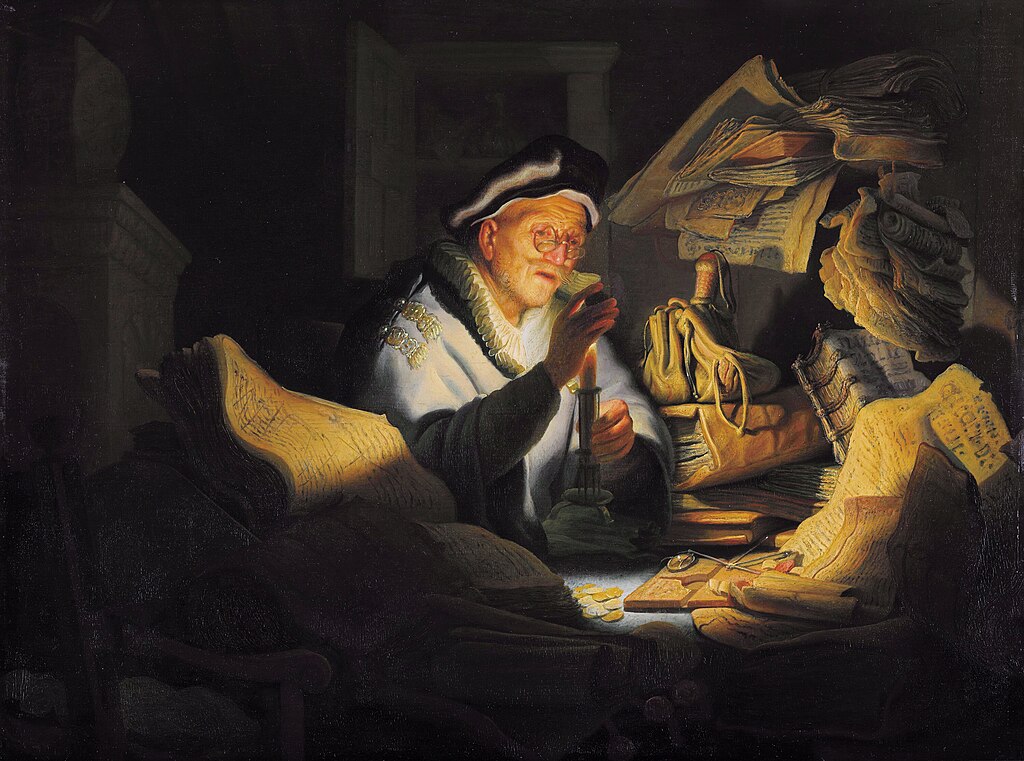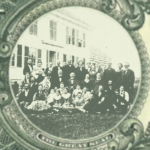We all seek and depend on money in one way or another, directly or indirectly, every day. If someone were to come up and offer us a winning lottery ticket for $100, $1,000, or even $1 million I doubt many—if any—of us would turn it down. The reality is, though, that despite many of our everyday worries and anxieties about making ends meet, about paying off that tuition bill, or about that mortgage or car loan, we are all living in the most economically developed and wealthy era in human history. We could spend a great deal of time examining data points about the massive increase in material wealth that the world—especially what is often called the developed world—has enjoyed since about the year 1750. Suffice it to say that we live amid what has been called a “mountainous rise in well being”—at least measured in material terms—over the last couple of centuries. This “great enrichment” is truly unprecedented, both in terms of scale (how many people are enjoying the benefits) and in terms of scope (what benefits are on offer).
And yet even in this midst of plenty, we find plenty to worry about. Certainly distribution of wealth is a legitimate concern, even as the opportunities for consumption of goods are generally more widespread than ever. There are many other data points we could examine relating to so-called “deaths of despair,” drug addiction, digital addiction, and all kinds of other social pathologies that indicate that even the level of material well-being we now experience is not enough to make us happy.
Why Aren’t We Happy?
Christ’s parable of the sower provides us with an important insight into this conundrum. We read in that parable that seed falls in different places. And Christ’s explanation is that the seed is the word of God, and that it falls among the thorns, “which grew up and choked the plants.” Later Christ explains, “The seed falling among the thorns refers to someone who hears the word, but the worries of this life and the deceitfulness of wealth choke the word, making it unfruitful.”
The worries of this life and the deceitfulness of wealth. These are two of the reasons that we are unhappy in this world. And they really are quite intimately related reasons, such that the latter, “the deceitfulness of wealth,” can be seen as a particular instance of the former, “the worries of this life,” or what could be translated as “the worries of this world,” or the “anxieties of this age.”
Start your day with Public Discourse
Sign up and get our daily essays sent straight to your inbox.Wealth is indeed attractive. It is attractive enough that two of the three temptations recorded when Satan tested Christ in the wilderness had to do with wealth and material well-being. As we read in Matthew 4, “The tempter came and said to him, ‘If you are the Son of God, command these stones to become loaves of bread.’ But he answered, ‘It is written, “Man shall not live by bread alone, but by every word that comes from the mouth of God.”’ And later, “the devil took him to a very high mountain and showed him all the kingdoms of the world and their glory. And he said to him, ‘All these I will give you, if you will fall down and worship me.’ Then Jesus said to him, ‘Be gone, Satan! For it is written, “You shall worship the Lord your God and him only shall you serve.”’” The tempter tried to deceive Jesus using the attractions of wealth, power, and comfort.
So the attraction of wealth is powerful. It is real. Therefore, we need to consider the ways in which wealth is deceitful. How does wealth deceive us? There are many, many ways that it does so, but I want to focus on three main relationships that wealth distorts or corrupts. Wealth deceives us as we think about our relationships to God, to our neighbors, and to the rest of the created order.
Wealth’s Deceits and Distortions
How does wealth deceive us in relation to God? Most fundamentally, money and wealth deceive us into thinking that they can replace God. This basic temptation to commit idolatry with money is why Christ warns us that we cannot serve two masters. We must choose between God and Mammon. As we get wealthier, we look less and less to God for guidance and help and we instead rely on our money to provide for our needs and our wants. Our thoughts become preoccupied with our paychecks, our bills, and our credit scores. Can I afford to rent this apartment? Can I buy this new iPhone? Can I buy these new clothes or fill my gas tank? As a brief illustration of the way in which wealth deceives us with respect to our dependence on God, consider the cycle of blessing and curses among the Israelites of the Old Testament. Time and again God would bless his people with prosperity in a land flowing with milk and honey, and time and again they would forget God and his commandments. The blessings of prosperity lead to idolatry and judgment, until the people cry out for mercy and return to God. Rinse and repeat.
Wealth also deceives us about our relationship to others. With money, we think, we don’t rely on others as much for things. We can simply buy what we need rather than depend on our family, friends, or neighbors for them. It is true that as goods and services become more developed and complex in an economy, our occasions for personal and face-to-face interactions tend to become fewer. Automation increases this dynamic. The reality is, of course, that we actually depend on the work of more and more people as the economy becomes more developed, but our distance from the people we depend on becomes greater.
If you won the lottery today—if someone handed you that $1-million winning ticket—what is one of the first things you would do? Pay off debt? Sure. Buy a new vehicle? Absolutely. Buy a new house? Almost assuredly. Would that new house give you more or less physical distance from your neighbors? Money and wealth enable us to actualize the alienation and isolation that we fallen human beings experience and express those relationships in physical space.
What about our relationship with the rest of creation? Wealth encourages us both to instrumentalize and to seek ultimate value in the world. As we become richer we are deceived into thinking that we can buy everything. More and more of our engagement with the world centers around consumption, and the things we encounter become commodities. All things are instruments for our satisfaction. “Eat, drink, and be merry.” But just as we are deceived to look to money rather than to God for our ultimate satisfaction, we become more and more accustomed to the world as it currently exists as if it were our final destination. Calvin P. Van Reken, a scholar of the Reformed Protestant tradition and one of my former professors, observed in a 2008 article in the Calvin Theological Journal that we used to recognize that there was a sin that went by the name of worldliness. “Reformed Christians,” he says,
used to think of the world as a dangerous place full of enticing temptations that can easily lead one away from God and the things of God. Christian believers even forty years ago were encouraged in sermons, hymns, and liturgies, to avoid entanglements in this world so as to live godly lives, always looking forward to the eternal city whose architect and builder is God.
This is what he describes as an older vision of the Christian life in relation to the world and to the broader culture. And while this view has its own shortcomings and limitations, Christ’s warnings about the worries of this world and the deceitfulness of wealth should encourage us to recover some of the older perspective’s clarity as it relates to the temptation to acquire “the values and attitudes promoted in a very secular culture,” as my professor put it.
So wealth deceives us in at least these three ways: in terms of our relationships to God, to others, and to this world. What, then, is the right posture with respect to wealth? What are we to think about money and the kingdom of God? At the risk of treating such weighty questions all too briefly and superficially, I will instead conclude by making just a few observations.
To begin with, money is not itself the problem. Money is a creation of God just like the air we breathe and the land that we inhabit. As Abraham Kuyper describes its origins, money
was fully in line with the design of God. It was not intended as a curse, but a blessing. It arose naturally from the way in which God related people to each other and to nature’s products, and the gold and silver that made this development possible were created by him. It was he who placed at man’s disposal the precious metals that lent themselves in every respect for use in trade.
It is only in the abuse of this good thing that God has given us that the problems, including its deceitfulness, arise. In this respect money is in the same situation as any other created good. Augustine of Hippo describes it this way:
Gold is loved wrongly by misers when they desert justice for its sake, although the fault lies not with the gold but rather with the man. This is true of every created thing. For, although it is good, it can be loved both rightly and wrongly — rightly when the proper order is preserved, wrongly when the proper order is overturned.
But money is very powerful, and as the classic bit of wisdom also advises us, the corruption of the best is the worst. And so money, that powerful creature of God intended to do us good with its proper use, is a tyrannous master. Here’s how Kuyper describes money as an idol, a godlike power:
Gold and silver money showed themselves to have a mysterious omnipotence. Gold soon revealed itself to be a god. As a metal its brilliance was bright and bewitched people, and gold could buy anything the heart desired. Anyone without gold found himself in an increasingly powerless position. Those who did have gold had a great world power in their hands, became entirely independent, could subject almost anything to themselves, and exercise dominion over a large territory. Everything could be bought for money. Anyone with gold had the entire world at his feet. Everything ceded to it; everything had to bow down before it. Even people could be bought with gold. Money could buy endless numbers of slaves, and the honor of men and the shame of women buckled before the radiance of gold.
Money is very powerful, and as the classic bit of wisdom also advises us, the corruption of the best is the worst. And so money, that powerful creature of God intended to do us good with its proper use, is a tyrannous master.
Slavery is formally outlawed today, but if wealth is as deceitful as Christ teaches in this parable of the sower, and we are the wealthiest society that has ever existed, then the occasion for temptation and deception is greater as well. And so we must cultivate habits of gratitude for what God has provided to us and practices of giving for what God wills.
Finally, the best answer to the question of how to avoid the deceitfulness of wealth is given to us by Christ earlier in the Gospel of Matthew. In chapter 6, at the conclusion of the Sermon on the Mount, Jesus uses the verbal form of the same word we encounter in this parable translated as worry or anxiety. “You cannot serve God and money,” warns Jesus. “Therefore I tell you, do not be anxious about your life, what you will eat or what you will drink, nor about your body, what you will put on. Is not life more than food, and the body more than clothing?” In other words, do not allow the gospel in you to be choked by the worries of this world, the anxieties of the age, or the deceitfulness of wealth. Instead, “seek first the kingdom of God and his righteousness, and all these things [that is, all the things we worry about in this world and all the things we need] will be added to you.” Food, drink, clothing, shelter—all of these are good things and necessary to live as God has created us to live. But to avoid the deceitfulness of wealth we must learn to trust in God, rather than in wealth or the power of this world. In so doing we learn to use his good gifts rightly, and with his blessing be like the seed that falls in the good soil, producing “a crop—a hundred, sixty or thirty times what was sown.”
A version of this article was originally delivered as a chapel talk at Redeemer University in Ancaster, Ontario.
Image: “The Parable of the Rich Fool” by Rembrandt. Sourced via Wikimedia Commons.














